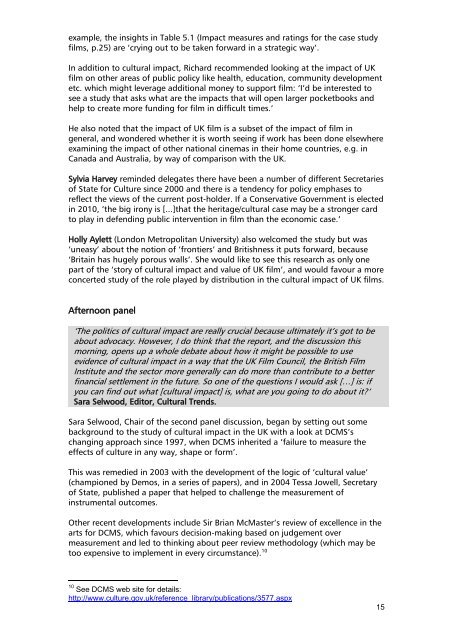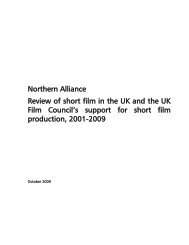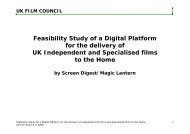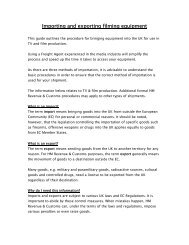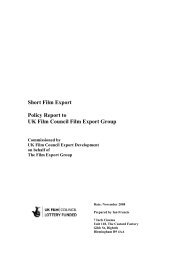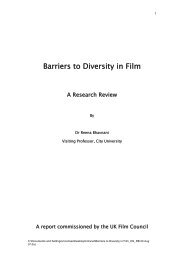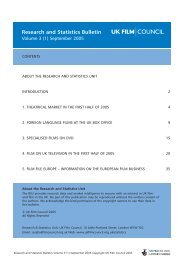The Cultural Impact of UK Film: Questions and Evidence
The Cultural Impact of UK Film: Questions and Evidence
The Cultural Impact of UK Film: Questions and Evidence
You also want an ePaper? Increase the reach of your titles
YUMPU automatically turns print PDFs into web optimized ePapers that Google loves.
example, the insights in Table 5.1 (<strong>Impact</strong> measures <strong>and</strong> ratings for the case study<br />
films, p.25) are ‗crying out to be taken forward in a strategic way‘.<br />
In addition to cultural impact, Richard recommended looking at the impact <strong>of</strong> <strong>UK</strong><br />
film on other areas <strong>of</strong> public policy like health, education, community development<br />
etc. which might leverage additional money to support film: ‗I‘d be interested to<br />
see a study that asks what are the impacts that will open larger pocketbooks <strong>and</strong><br />
help to create more funding for film in difficult times.‘<br />
He also noted that the impact <strong>of</strong> <strong>UK</strong> film is a subset <strong>of</strong> the impact <strong>of</strong> film in<br />
general, <strong>and</strong> wondered whether it is worth seeing if work has been done elsewhere<br />
examining the impact <strong>of</strong> other national cinemas in their home countries, e.g. in<br />
Canada <strong>and</strong> Australia, by way <strong>of</strong> comparison with the <strong>UK</strong>.<br />
Sylvia Harvey reminded delegates there have been a number <strong>of</strong> different Secretaries<br />
<strong>of</strong> State for Culture since 2000 <strong>and</strong> there is a tendency for policy emphases to<br />
reflect the views <strong>of</strong> the current post-holder. If a Conservative Government is elected<br />
in 2010, ‗the big irony is [...]that the heritage/cultural case may be a stronger card<br />
to play in defending public intervention in film than the economic case.‘<br />
Holly Aylett (London Metropolitan University) also welcomed the study but was<br />
‗uneasy‘ about the notion <strong>of</strong> ‗frontiers‘ <strong>and</strong> Britishness it puts forward, because<br />
‗Britain has hugely porous walls‘. She would like to see this research as only one<br />
part <strong>of</strong> the ‗story <strong>of</strong> cultural impact <strong>and</strong> value <strong>of</strong> <strong>UK</strong> film‘, <strong>and</strong> would favour a more<br />
concerted study <strong>of</strong> the role played by distribution in the cultural impact <strong>of</strong> <strong>UK</strong> films.<br />
Afternoon panel<br />
‗<strong>The</strong> politics <strong>of</strong> cultural impact are really crucial because ultimately it‘s got to be<br />
about advocacy. However, I do think that the report, <strong>and</strong> the discussion this<br />
morning, opens up a whole debate about how it might be possible to use<br />
evidence <strong>of</strong> cultural impact in a way that the <strong>UK</strong> <strong>Film</strong> Council, the British <strong>Film</strong><br />
Institute <strong>and</strong> the sector more generally can do more than contribute to a better<br />
financial settlement in the future. So one <strong>of</strong> the questions I would ask […] is: if<br />
you can find out what [cultural impact] is, what are you going to do about it?‘<br />
Sara Selwood, Editor, <strong>Cultural</strong> Trends.<br />
Sara Selwood, Chair <strong>of</strong> the second panel discussion, began by setting out some<br />
background to the study <strong>of</strong> cultural impact in the <strong>UK</strong> with a look at DCMS‘s<br />
changing approach since 1997, when DCMS inherited a ‗failure to measure the<br />
effects <strong>of</strong> culture in any way, shape or form‘.<br />
This was remedied in 2003 with the development <strong>of</strong> the logic <strong>of</strong> ‗cultural value‘<br />
(championed by Demos, in a series <strong>of</strong> papers), <strong>and</strong> in 2004 Tessa Jowell, Secretary<br />
<strong>of</strong> State, published a paper that helped to challenge the measurement <strong>of</strong><br />
instrumental outcomes.<br />
Other recent developments include Sir Brian McMaster‘s review <strong>of</strong> excellence in the<br />
arts for DCMS, which favours decision-making based on judgement over<br />
measurement <strong>and</strong> led to thinking about peer review methodology (which may be<br />
too expensive to implement in every circumstance). 10<br />
10 See DCMS web site for details:<br />
http://www.culture.gov.uk/reference_library/publications/3577.aspx<br />
15


